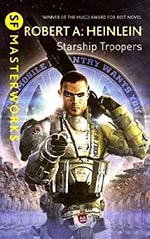
![]() Emil
Emil
5/14/2011
![]()
Very few science fiction novels have aroused such controversy over the decades as Starship Troopers by Robert A. Heinlein. This militaristic epic, winner of the 1960 Hugo Award, has been accused not merely of glorifying military values but of endorsing fascism to the point that one could say that the Terran Federation is analogous to Nazi Germany. An extreme analysis of course, which in our post-modernist world is terribly unfair, but there is no denying that Starship Troopers is indeed a pseudo-Darwinian rationale for an endless inter-species war of all against all. The novel, as it stands accused by many critics, rapidly degenerates into a series of lectures about politics, history and philosophy by way of various mouthpieces; and reverberates "that Heinlein voice."
Oddly, I still found it compelling and stimulating, taking an interest in its political and moral philosophy rather than being converted to what is advocated in the text. It's actually quite far from the fascism it is accused of. Anyone who can understand the oath may serve, regardless of their attributes or abilities. There are no wars within the human species, with lots of personal freedom, where almost everyone is reasonably well off and people who despise the government can do so openly and fearlessly.
A student of history will notice that the communal ideology of the alien "Bugs" is virtually identical to Western Cold War understanding of Communism and the Soviet Union. There is a delightful, explicit critique of Marxism as Rico concludes at one point:
"We were learning, expensively, just how efficient a total Communism can be when used by a people adapted to it by evolution; the Bug commissars didn't care any more about expending soldiers than we care about expending ammo."
Virulent anti-Communist! Undoubtedly right-wing in its politics and unashamedly militaristic but also one of the finest coming-of-age narratives in science fiction. We follow Rico's rites of passage, making many mistakes along the way, and contrary to a glorifying view of war, avoiding blind heroism. (Don't ever confuse the book with the movie sharing the same name!)
It is undeniably a significant work in the history of the genre, pioneering an entire sub-genre of military space opera, even if only paradoxical in that many, like Joe Haldeman and Orson Scott Card, have written fiction in conscious opposition to the philosophy espoused in Starship Troopers.
"To the everlasting glory of the infantry..."